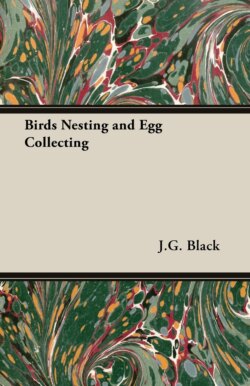Читать книгу Birds Nesting and Egg Collecting - J. G. Black - Страница 18
На сайте Литреса книга снята с продажи.
$ 8. THE NOTE-BOOK.
ОглавлениеEvery naturalist should keep a note-book for two good reasons. The first is that your memory plays funny tricks, and lets all sorts of useful things slip; and even brings facts out at times quite different from when they went in. If you have ever heard fishermen talking about the good old days of their youth you will know what I mean. Now, experience is the thing to help you on with your hobby more than anything; and you lose a good deal of it and get rather hazy about a good deal more, unless you have the facts to look up, just as you wrote them down at the time. You can’t possibly remember such things as the dates when you found this bird or that, and the longer you go on the more useful such knowledge becomes.
The second reason is the pleasure you get from looking up old notes, which remind you of all sorts of joys you would otherwise have forgotten, patience rewarded, unexpected bits of luck, narrow escapes, and good times generally. Even the bad days are sometimes good to remember after a year or two.
We will suppose you are going to keep a note-book. The next question is what you are going to put in it. I advise you to put in every nest from which you take an egg, the first nest of each bird each year, any late ones or second broods, and any other that has anything specially interesting about it.
Your notes are easier to look up if you have them in columns, and a good arrangement is—
Date. No. Bird. Eggs. Place. Nest. Remarks.
I should take two pages, and give the whole right-hand page to the “Remarks” column. Here you put the interesting things, such as how you found the nest, how the birds behaved and what happened later, when the eggs hatched, and the young ones flew, in fact, anything. The “Nest” column should be the next biggest, for putting where it was built, what it was made of, and anything else of interest. “Eggs” should be given as fresh, sitting, hard sat, young, and so on; and the number of the entry is most useful, if you number your eggs, as you can turn up No. 6 or No. 293 in a moment, just by the size of the number.
You don’t need to put in your register only nests that have eggs; if you find an uncommon bird with young ones, or even see the family after they have left the nest, the date and place will give you a good idea as to when and where to look for it next year. Many birds, even when they have spent the winter in Africa, will come back to the same little corner of England, and build within a yard or two of their last year’s nest; and if it is in a hole, it is very likely to be in the same hole next year.
In the case of rare birds, any record of their having bred or tried to breed in your neighbourhood is useful. For instance, suppose there is only one Chiff-chaff anywhere near you, and you hear him singing in the same tree all through the nesting season, but never manage to find the nest; if you note down the place, you will not forget to look him up next summer, and perhaps with more success.
